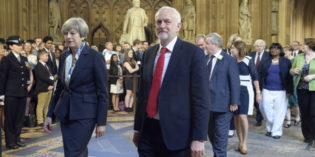Achieving accountable government

Brian Klaas: ‘The incentives for a Trump 2.0 will be exactly the same as the incentives for Trump’
In his first year in power, argues Brian Klaas (LSE), Donald Trump has deployed the tactics of despots and begun to corrode the institutions of US democracy. What happens next? Democratic Audit editor Ros Taylor talks to him about his new book, The Despot’s Apprentice. Mike Pence, Paul Ryan, Donald Trump and Mitch McConnell celebrate […]

How the planning system lets homeowners overwhelm the broader public interest
Britain needs more housing, especially in the South East, yet the green belt still enjoys a great deal of protection from development. John Sturzaker (University of Liverpool) looks at the difficulty of establishing whether NIMBYism is motivated by self-interest or legitimate concerns – and the imbalance of power between people who need housing, and those […]

Where would an English Parliament be located?
Ongoing UCL Constitution Unit research is exploring options for an English Parliament. The choice of location would have major practical implications, as well as being of high symbolic importance. Jack Sheldon (UCL Constitution Unit) sets out the factors that would need to be considered. He suggests that while a ‘dual mandate’ English Parliament would almost certainly meet […]

We need to understand why states object to the presence of foreign-funded NGOs
More and more countries restrict how NGOs operate, often by limiting their funding. The response is frequently to argue that these restrictions flout international law or amount to crackdowns on the opposition. Annika E Poppe and Jonas Wolff (Peace Research Institute Frankfurt) argue that the objections to NGO activity need to be taken seriously. In […]

Does the online tool WriteToThem foster meaningful communication with constituents?
Some predicted the internet would be the silver bullet that could deal with the deficits of representative democracy. Others were less optimistic about its potential to foster democracy. Hartwig Pautz (University of the West of Scotland) looks at whether the e-democracy tool WriteToThem allows for meaningful communication between citizens and their elected representatives. Photo: Barry via a CC-BY-NC-SA […]

Form a party or start a pressure group? The choice facing nascent political movements
When you’re an under-represented group, changing policy is hard. Do you form a party or start a pressure group? Disagreements about the best way forward have historically riven the Green movement in both France and the UK. Ben Farrer (Knox College) explains why activists need to think about how national institutions in their country work […]

Corbyn’s rent controls: radical new housing policy, or just rhetoric?
If there is one thing that Labour and Conservatives currently have in common, it is that both appear ready to embark on a step change in housing policy. But are Jeremy Corbyn’s recent announcements on rent controls a sign of change, or just another new political language for ‘masterly inactivity’? Ben Pattison (Sheffield Hallam University) reviews Labour’s […]

Book review | Diploma Democracy: The Rise of Political Meritocracy
In Diploma Democracy: The Rise of Political Meritocracy, Mark Bovens and Anchrit Wille examine how Western democracies are shaped by educational inequalities that lead to gaps in political participation and governments being dominated by academic elites. While some of the authors’ solutions for these ‘diploma democracies’ are less convincing, this is a very useful account of the influence of education on […]

How Parliament’s campaign of attrition forced the government to open up about Brexit
The real battle over Brexit has not been about whether Parliament will get a final vote, writes Ben Worthy (Birkbeck University of London). The true fight is about information – about what kind of Brexit the government wants, and what its impact is likely to be. In this, Parliament has been rather successful. Pressure from select committees and […]



 Democratic Audit's core funding is provided by the Joseph Rowntree Charitable Trust. Additional funding is provided by the London School of Economics.
Democratic Audit's core funding is provided by the Joseph Rowntree Charitable Trust. Additional funding is provided by the London School of Economics.